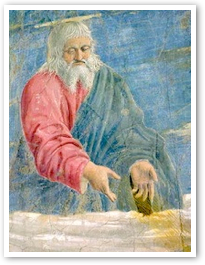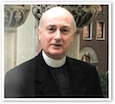The word that I have spoken will be his judge
- FATHER GEORGE W. RUTLER
The Second Sunday of Advent points attention to two kinds of judgment.
 During the 1976 Eucharistic Congress in Philadelphia, a relatively unknown figure, the Archbishop of Krakow and future John Paul II, said: "We are now standing in the face of the greatest historical confrontation humanity has ever experienced. I do not think that the wide circle of the American society, or the whole wide circle of the Christian community realize this fully. We are now facing the final confrontation between the Church and the anti-church, between the Gospel and the anti-gospel . . . . The confrontation lies within the plans of Divine Providence. It is . . . a trial which the Church must take up, and face courageously."
During the 1976 Eucharistic Congress in Philadelphia, a relatively unknown figure, the Archbishop of Krakow and future John Paul II, said: "We are now standing in the face of the greatest historical confrontation humanity has ever experienced. I do not think that the wide circle of the American society, or the whole wide circle of the Christian community realize this fully. We are now facing the final confrontation between the Church and the anti-church, between the Gospel and the anti-gospel . . . . The confrontation lies within the plans of Divine Providence. It is . . . a trial which the Church must take up, and face courageously."
Those words in Philadelphia certainly were as prophetic as the voices in Judea thousands of years ago. In the subsequent generation, crammed with breathtaking events of universal and historic significance, heroic and tragic, we can count the manifold ways in which that future pope seemed to see the judgment of God at work.
The Second Sunday of Advent points attention to two kinds of judgment. First, and most immediate for the human condition, is the particular judgment each of us will experience at the moment of death, when our life passes before us. Christ as Judge makes no arbitrary decisions, but rather avails himself as the measure of our compatibility with his love. The other judgment is the social judgment of the whole world. This will happen at the end of time when all created things and time and space themselves will end. There was an intimation of this in the earthquake when Christ died on the cross, as prelude to his resurrection when he could "die no more."
Confronting the Judge, we have the option of two kinds of fear. The first is the perplexity of the person who knows only self-love and has lived life as though the self were God. The second is the joyful awe sensed by the person who has loved God and neighbor as much as the self.
In the moral order, people have to make judgments for the sake of sanity, but those judgments must be based on standards outside one's sentiments, rather than the way we measure objects according to the standards set by the Bureau of Weights and Measures. Jesus submitted to the judgment of Pontius Pilate, and by so doing, he took on the suffering of those who are wrongly judged. But Jesus did not deny Pilate's right to pass judgment, while reminding Pilate that he was answerable to a higher authority: "You would have no power over me were it not given to you from above" (John 19:11). The command not to judge others is about defining justice without accountability to God. "He who rejects me and does not receive my sayings has a judge; the word that I have spoken will be his judge on the last day" (John 12:48).
 This is Meaghen Gonzalez, Editor of CERC. I hope you appreciated this piece. We curate these articles especially for believers like you.
This is Meaghen Gonzalez, Editor of CERC. I hope you appreciated this piece. We curate these articles especially for believers like you.
Please show your appreciation by making a $3 donation. CERC is entirely reader supported.

Acknowledgement
 Father George W. Rutler. "The word that I have spoken will be his judge." From the Pastor (December 9, 2015).
Father George W. Rutler. "The word that I have spoken will be his judge." From the Pastor (December 9, 2015).
Reprinted with permission of Father George W. Rutler.
The Author
 Father George W. Rutler is the pastor of St. Michael's church in New York City. He has written many books, including: The Wit and Wisdom of Father George Rutler, The Stories of Hymns, Hints of Heaven: The Parables of Christ and What They Mean for You, Principalities and Powers: Spiritual Combat 1942-1943, Cloud of Witnesses — Dead People I Knew When They Were Alive, Coincidentally: Unserious Reflections on Trivial Connections, A Crisis of Saints: Essays on People and Principles, Brightest and Best, and Adam Danced: The Cross and the Seven Deadly Sins.
Father George W. Rutler is the pastor of St. Michael's church in New York City. He has written many books, including: The Wit and Wisdom of Father George Rutler, The Stories of Hymns, Hints of Heaven: The Parables of Christ and What They Mean for You, Principalities and Powers: Spiritual Combat 1942-1943, Cloud of Witnesses — Dead People I Knew When They Were Alive, Coincidentally: Unserious Reflections on Trivial Connections, A Crisis of Saints: Essays on People and Principles, Brightest and Best, and Adam Danced: The Cross and the Seven Deadly Sins.




